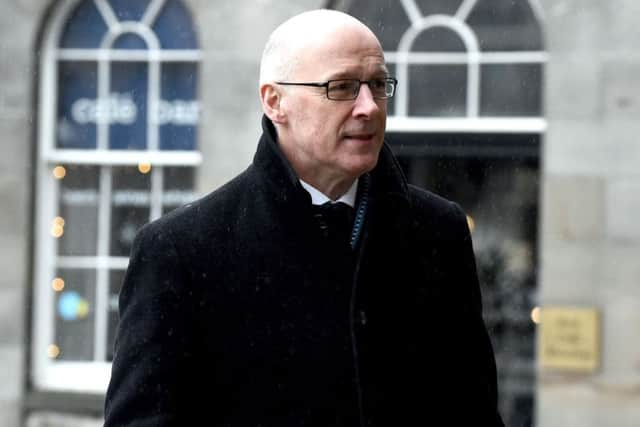John Swinney fails to reach deal over Brexit '˜power grab' impasse
UK Cabinet Secretary David Lidington, Theresa May’s de facto deputy, met Deputy First Minister John Swinney at the Scottish Parliament last night. Scottish Secretary David Mundell and Scottish Brexit minister Mike Russell were also present.
Mr Russell had earlier threatened to publish the UK government’s “leaked” forecasts for the impact of Brexit, which reportedly show all scenarios are damaging for UK growth.
Advertisement
Hide AdAdvertisement
Hide AdAnd the SNP minister last night hit out at the attitude of the UK government delegation during the talks at Holyrood, insisting it resulted in no “meaningful discussion” taking place. Mr Lidington had earlier claimed that “progress” was made in reaching a deal.


The talks were aimed at breaking the impasse over the EU Withdrawal Bill amid fears in Scotland that it will result in Westminster taking control of powers coming back from the EU which rightfully belong at Holyrood. Mr Russell said he made it clear during last night’s meeting that the bill was “incompatible” with devolution.
He added: “Both the Deputy First Minister and I found the discussion very frustrating.
“The UK government has rejected Scottish and Welsh government amendments that would protect devolution but, despite its previous commitment, has failed to bring forward any solution of its own. Despite many meetings, once again the UK ministers arrived and left without putting words on the table to allow for a meaningful discussion.
“So we are still in the position that the Scottish Government cannot and will not recommend that the bill should receive legislative consent.”


But the Scottish Secretary played down Mr Russell’s approach to negotiations as he briefed journalists.
“Mike’s Mike and that’s just how he is,” Mr Mundell said.
But he added: “I remain confident that we can get there on the basis that the Scottish Government can recommend to the Scottish parliament that they give legislative consent to the EU Withdrawal Bill.”
Mr Lidington insisted that the talks had made “progress” and claimed they “got into the detail” which Scottish ministers had been seeking.
Advertisement
Hide AdAdvertisement
Hide AdHe said: “We want the route that we choose for our exit from the European Union to be one that works for every part of the UK and every part of Scotland.”
He added: “Both Scottish ministers made it clear that they want to find a way of doing a deal. We haven’t cracked it completely yet, but getting into the detail as we did today will be an important step forwards.”
MSPs have said they will reject the bill without significant changes that would allay concerns of a “power grab”.
Many of the EU powers returning to the UK in areas such as farming and fishing belong at Holyrood, according to the Scotland Act that brought about devolution.
But the bill drawn up at Westminster proposes that these will all be transferred to Westminster at the point of Brexit, before UK ministers decide which additional responsibilities are then to be passed on to Holyrood.
Mr Russell had earlier threatened to publish leaked economic analysis on Brexit, after UK Brexit minister Robin Walker indicated that devolved administrations would have access to it.
In a letter to his UK counterpart David Davis, Mr Russell said the public “have a right to know” what civil servants believe the impact of leaving the EU will be. He stated: “I want to be clear that if you send the analysis to us we will make it public.”